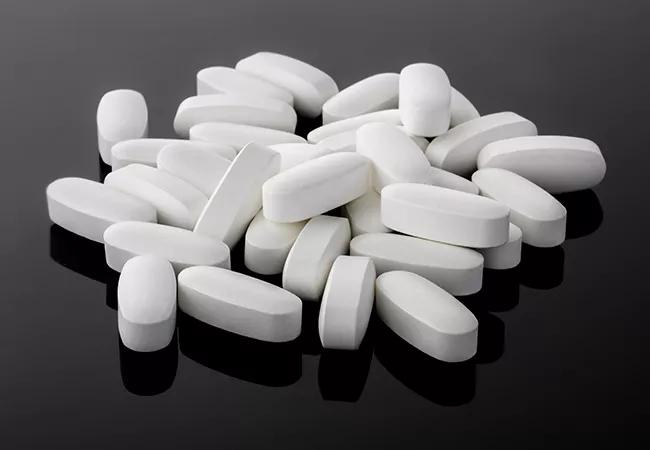Observational findings over 5+ years of follow-up argue for caution in this population

Calcium supplementation with or without vitamin D is associated with lower long-term survival and higher rates of aortic valve replacement (AVR) among patients aged 60 or older with mild to moderate aortic stenosis. That’s the primary finding of a retrospective longitudinal analysis of a large cohort of Cleveland Clinic patients. The study, published online in Heart, found no association between adverse outcomes and supplemental vitamin D alone.
Advertisement
Cleveland Clinic is a non-profit academic medical center. Advertising on our site helps support our mission. We do not endorse non-Cleveland Clinic products or services. Policy
“These results suggest that supplemental calcium confers no cardiovascular benefit in older patients with aortic stenosis but rather appears to exert a detrimental effect, especially in those not undergoing AVR,” says senior author Samir Kapadia, MD, Chair of Cardiovascular Medicine at Cleveland Clinic. “This argues for careful consideration of cardiovascular risk before starting or continuing calcium supplementation in this patient population, particularly if it is not strongly indicated.”
Controversy surrounds the relationship between dietary and supplemental calcium and vitamin D intake and cardiovascular risk, but that has not prevented growth in the use of calcium and vitamin D supplements in recent years, especially among postmenopausal women aiming to reduce osteoporosis risk.
Because aortic stenosis is marked by severe calcification that can lead to immobility of aortic valve leaflets and outflow obstruction, calcium intake is a matter of particular interest in patients with this condition. Yet data on the effects of supplemental calcium or vitamin D in the setting of aortic stenosis have been limited to animal models and human studies with small sample sizes.
“In light of increasing use of supplementation among elderly patients, studies evaluating the long-term safety and hemodynamic effects of supplementation are imperative,” says Dr. Kapadia.
In response, he and Cleveland Clinic colleagues undertook the largest such study in patients with aortic stenosis to date. They identified consecutive patients aged 60 or older with mild or moderate native-valve aortic stenosis from the Cleveland Clinic echocardiography database during the years 2008-2016. The 2,657 qualifying patients were stratified by supplementation status as follows:
Advertisement
Compared with patients not taking supplements, those who took supplements were more likely to have diabetes and coronary artery disease; more likely to take statins, warfarin and phosphate binders; and more likely to have undergone coronary artery bypass surgery and to need kidney dialysis.
Outcomes of interest were all-cause mortality, cardiovascular mortality and AVR; aortic stenosis progression (by aortic valve area and peak/mean gradients) was a secondary outcome.
Patients were predominantly male (58%), had a mean age of 74 years and had a median of 69 months (5.75 years) of follow-up from baseline echocardiogram. The median duration of supplementation was 67 months in the calcium group and 70 months in the vitamin D group.
Across the overall cohort, 20.3% of patients died during follow-up and 29.1% underwent AVR.
Key results by supplementation category included the following:
Advertisement
Dr. Kapadia says he was surprised that the need for AVR was so high in this study and that calcium supplementation was not associated with more rapid worsening of the valve gradient in view of the clinical outcome findings. “It may be that patients died or underwent AVR before greater gradient changes could be seen,” he observes.
While the study’s observational nature precludes conclusions about causality, Dr. Kapadia says this investigation makes a compelling case for caution before starting or continuing long-term calcium supplementation in patients with aortic stenosis unless its use is mandatory for osteoporosis therapy — a point echoed in an accompanying editorial in Heart. The case is bolstered by the study’s large sample size and substantial follow-up period, he adds.
A natural next research question, he notes, is whether avoiding calcium supplementation in patients who have undergone surgical or transcatheter AVR with a biological prosthetic valve may increase the longevity of the replacement valve. “This is the next step in our study of this issue,” he says.
Another intriguing research question is whether giving supplemental vitamin K2 — which is believed to increase uptake of calcium by the bones and reduce its deposition in the heart — along with vitamin D may improve the durability of biological aortic valve prostheses. “This is a question we hope to study before long,” Dr. Kapadia notes.
“The current study sheds an important light on the potential association between over-the-counter calcium/vitamin D supplementation and aortic valve calcification,” adds study co-author Milind Desai, MD, MBA, Director of Clinical Operations in Cleveland Clinic’s Miller Family Heart, Vascular & Thoracic Institute. “It also raises potential questions about the longevity of prosthetic valves in the setting of such supplement use. At the very least, it raises the question of whether a randomized controlled trial is needed to address this hypothesis. With aging of the population, increased diagnosis of aortic stenosis and increased use of AVR, this would be an appropriately timed study.”
Advertisement
Advertisement

Researchers explore the mental and physical benefits of social prescribing

Multidisciplinary approach helps address clinical and psychosocial challenges in geriatric care

Effective screening, advanced treatments can help preserve quality of life

Study suggests inconsistencies in the emergency department evaluation of geriatric patients

Auditory hallucinations lead to unusual diagnosis

How providers can help prevent and address this under-reported form of abuse

How providers can help older adults protect their assets and personal agency

Recognizing the subtle but destructive signs of psychological abuse in geriatric patients